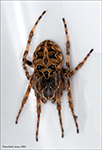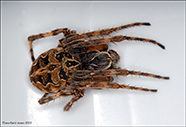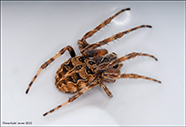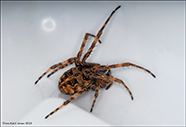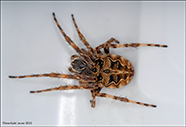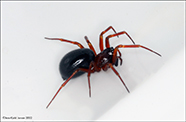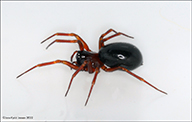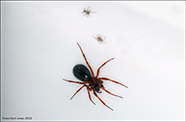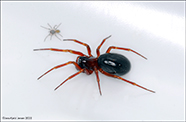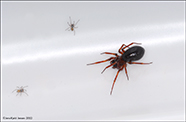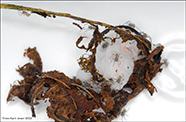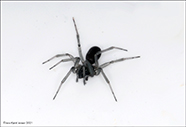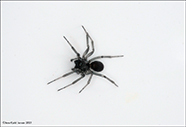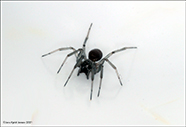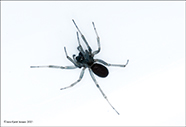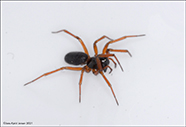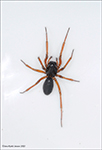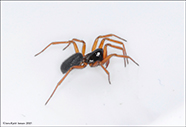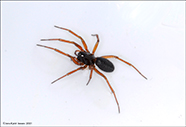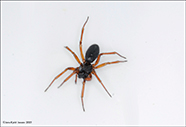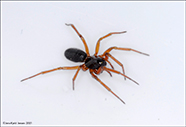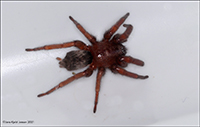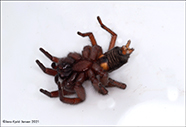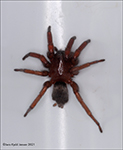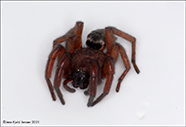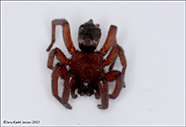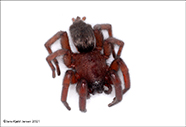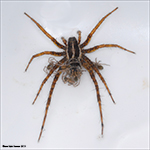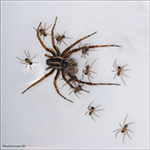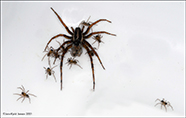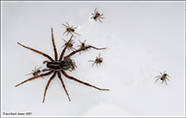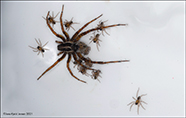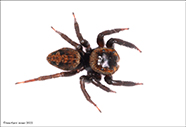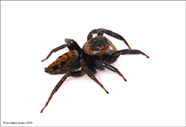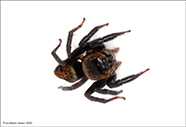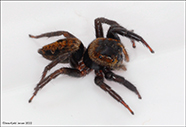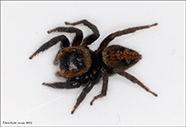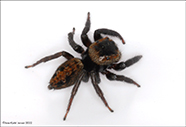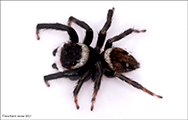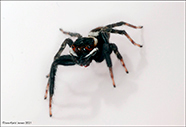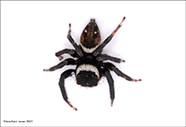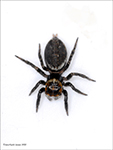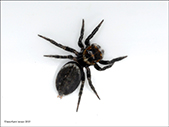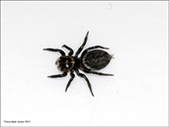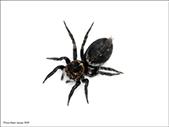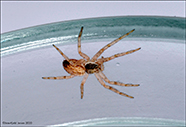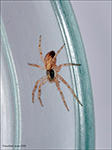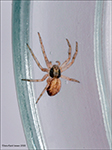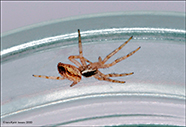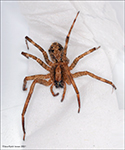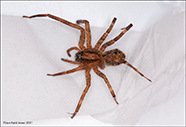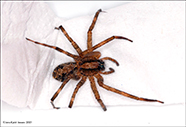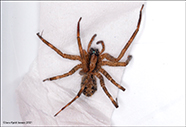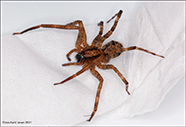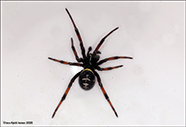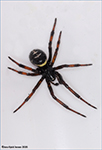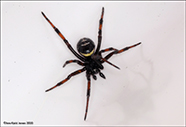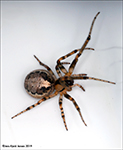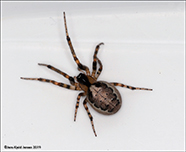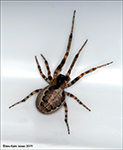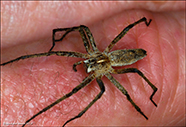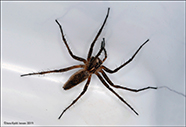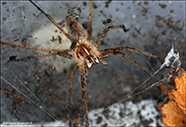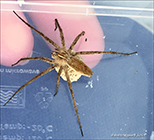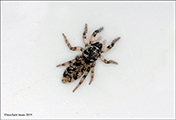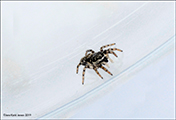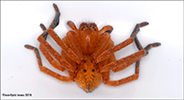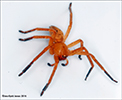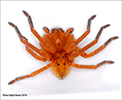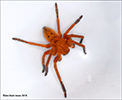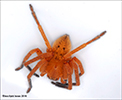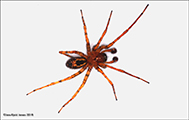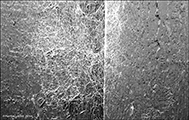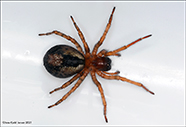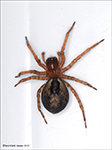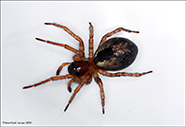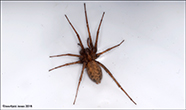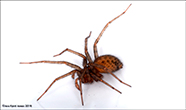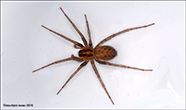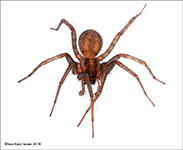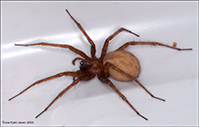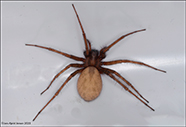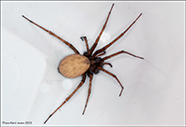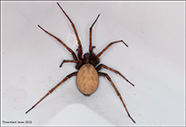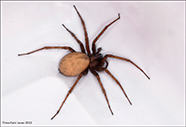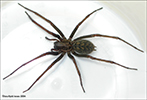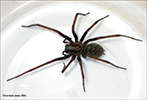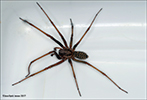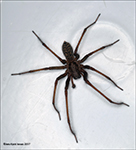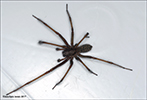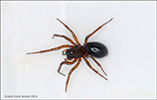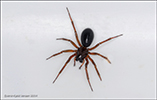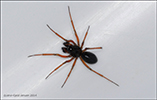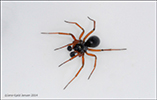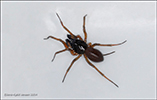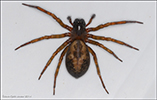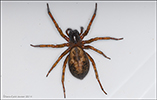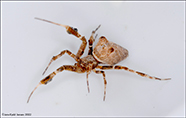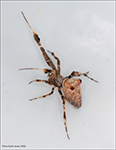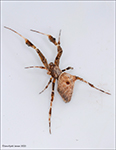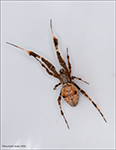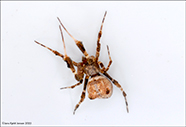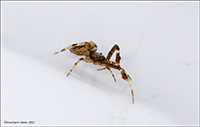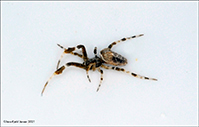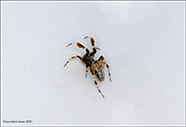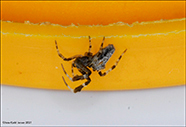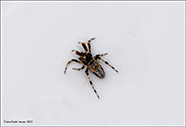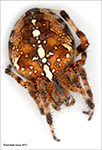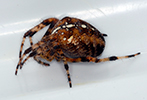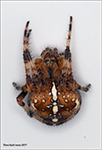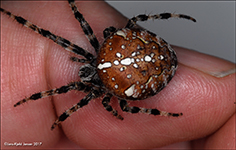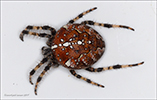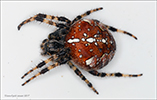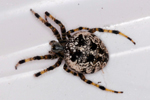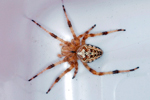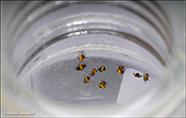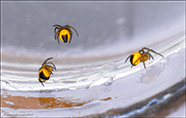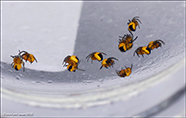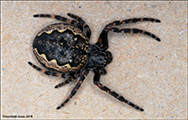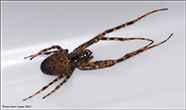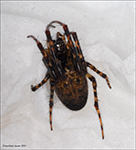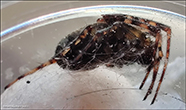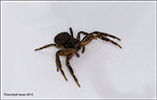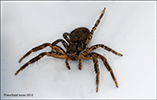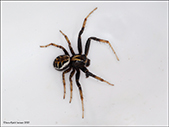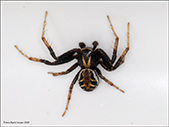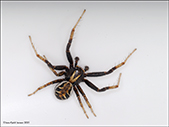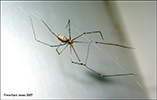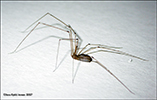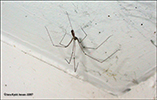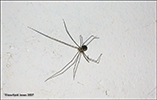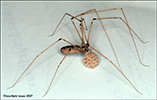|
||||||||||||||||
Triangulate cobweb spider Steatoda triangulosa |
||||||||||||||||
Date: 30.03.2025. New spider for the Faroe Islands. |
||||||||||||||||
Karis Danielsen saw this spider indoors in Eysturoy in September 2024 and in March 2025 she was lucky enough to catch it. There are several others at the site. |
||||||||||||||||
This spider is native to Eurasia. |
||||||||||||||||
| Larinioides sclopetarius | ||||||||||||||||
| This Larinioides sclopetarius spider was caught by Dánial Jespersen on July 10, 2022 in Klaksvík. This species has only been registered twice previously in the Faroe Islands and both times in 2002. | ||||||||||||||||
| Leptorhoptrum robustum | ||||||||||||||||
12.06.2022 Bjarki Gyldenkærne Dalsgarð caught a spider of the species Leptorhoptrum robustum under a flowerpot in Skógrøktin in Hoydalar. The spider is only 3-5 mm in size and quite common all over the Faroe Islands. |
||||||||||||||||
| Agyneta gulosa | ||||||||||||||||
| Rare in Faroe Islands, found in Sornfelli 11.07.2021 | ||||||||||||||||
| Oreoneta frigida | ||||||||||||||||
| A very common spider in Faroe Islands, found in Sornfelli 11.07.2021 | ||||||||||||||||
| Mouse Spider Scotophaeus blackwalli | ||||||||||||||||
| Súsanna Árting found this Mouse Spider Scotophaeus blackwalli at her home October 13, 2021. This is the first registrated observation of Scotophaeus blackwalli in the Faroe Islands. The spider most likely came to the Faroe Islands with building material. Mouse spider thrives only indoors. | ||||||||||||||||
| Pardosa palustris (Linnaeus, 1758) | ||||||||||||||||
Rodmund á Kelduni caught this beautiful spider of the species Pardosa palustris (Linnaeus, 1758) in Víkum, Vágar 07.08.2021. When Jens-Kjeld Jensen photographed it the next day, it had had lots of kids. |
||||||||||||||||
| Hasarius adonsoni | ||||||||||||||||
| Found in Tórshavn 28.02.2022. This is the fourth observation of Hasarius adonsoni in Faroe Islands. | ||||||||||||||||
| Hasarius adonsoni | ||||||||||||||||
| It gets shorter and shorter between the imported spiders ... | ||||||||||||||||
| 10.05.2021 Ragnar Háskor found this Hasarius adonsoni spider among some flowers, he had bought on Mother's Day. This is the third observation of Hasarius adonsoni in Faroe Islands. | ||||||||||||||||
30.04.2021 Barba Mørkøre Dalberg found this Hasarius adonsoni male spider indoors in Tórshavn. Hasarius adonsoni has been found once before in the Faroe Islands. It will be able to breed in greenhouses, but not outdoors in the Faroe Islands. |
||||||||||||||||
Philodromus dispar |
||||||||||||||||
02. September 2020, Erla Jarnskor Ellingsgaard caught a non-adult spider of the genus Philodromus in their garden in Syðrugøta. The spider was sent to Denmark, where Jørgen Lissner has cared for and fed it for 8 months, while he has been waiting for it to change skins, so he could determine the species to be a Philodromus dispar. As an adult, this species is very variable in size and color pattern. |
||||||||||||||||
Philodromus dispar does not spin, but catches its prey by ambush. |
||||||||||||||||
This is the first time that this species, which lives in warmer places as the Mediterranean, is registered in the Faroe Islands, but perhaps there are optimal conditions or a special microclimate in a sunny part of the garden at Erla's home. |
||||||||||||||||
| Acanthoctenus spinipes (Keyserling, 1877) | ||||||||||||||||
This beautiful migratory spider (Ctenidae) Acanthoctenus spinipes Keyserling, 1877) was found in Tórshavn in March 2021 in a box of bananas from Columbia. This is probably the first time, this species has been found in Europe. The species was determined by Jørgen Lissner. |
||||||||||||||||
| Steatoda paykulliana | ||||||||||||||||
28.09.2020 Sóley H. Gásdal, Sørvágur, found this beautiful spider in a pack of grapes, imported from Greece. This is the first registration of Steatoda paykulliana in the Faroe Islands. |
||||||||||||||||
| Zygiella x-notata | ||||||||||||||||
 |
||||||||||||||||
| Common in Faroe Islands | ||||||||||||||||
| Nursery web spider Pisaura mirabilis | ||||||||||||||||
| July 14, 2019, Judit Højgaard found this Nursery web spider Pisaura mirabilis in Leirvík. It is imported with goods. This is the first registration of Pisaura mirabilis in the Faroe Islands. | ||||||||||||||||
| Zebra back spider Salticus scenicus | ||||||||||||||||
| 03. March 2019 Sheila Sigurdsdóttir captured this Zebra back spider Salticus scenicus indoors in Fuglafjørður. This species has been seen a few times before, also as introduced. | ||||||||||||||||
Olios argelasius (Walckenaer 1805). |
||||||||||||||||
Around 15.10.2018 Gudbjørg Gudmundsdóttir Poulsen found this spider in a tray of imported grapes. This spider is common in Southern Europe, where it for example lives in the leaves of grape bushes. |
||||||||||||||||
| Amaurobius fenestralis | ||||||||||||||||
| Male - even though this spider is new for Faroe Islands, it seems to be quite common, especially in Sørvágur and Tórshavn. | ||||||||||||||||
| The spider Amaurobius fenestralis was found for the first time in 2007 by Rodmund á Kelduni. | ||||||||||||||||
| The species seems to spread very fast - particularly in Vágar and the southern part of Streymoy. The net of the spider is quite special, and in case people start searching for it I am pretty sure, that the spider will be found in several other places than the two, mentioned above. |
||||||||||||||||
| Tórshavn 03.05.2021 | ||||||||||||||||
| Domestic house spider Tegenaria domestica (Clerck, 1757) | ||||||||||||||||
| The female | ||||||||||||||||
| The male | ||||||||||||||||
| Hanna Joensen, Sandur, caught these two spiders in Sandoy 04.09.2018. The species are found in most of the Faroe Islands, but this is the first registration of the species in Sandoy. | ||||||||||||||||
| __________________________________________________________ | ||||||||||||||||
| This very bright Domestic house spider was handed to us 10.02.2022 | ||||||||||||||||
| Giant House Spider Tegenaria atrica (C. L. Koch, 1843). | ||||||||||||||||
| The female | ||||||||||||||||
| The male | ||||||||||||||||
| The photos of the female spider are from 2004. The male spider was found by Sámal Einarsson and others in Eysturoy 13. October 2017. The species has been found regularly in Faroe Islands during the recent years, and it is probably breeding in Tórshavn. The distribution area for Giant House Spider is Europe, Central Asia and North Africa, but it is spreading more and more from these areas. It was brought to Northwest and North America with people around 1900, and since then it has increased much in number. With a leg width of up to 10 cm and a speed of 0.53 m pr. seconds, it is one of the world's fastest spiders. It can become up to 6 years old and lays approximately 60 eggs each time. |
||||||||||||||||
| Larinioides ixobolus (Thorell, 1873) | ||||||||||||||||
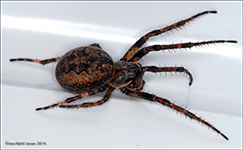 |
||||||||||||||||
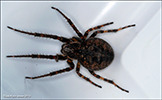 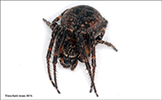 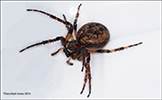 |
||||||||||||||||
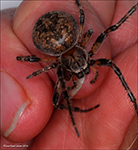 |
||||||||||||||||
| Larinioides ixobolus (Thorell, 1873) | ||||||||||||||||
| 19.11.2016 Torkil Sørensen found 2 female spiders of the genus Larinioides ixobolus when he was working on a car at the garage of Glenn Perdomo in Torshavn. The car was imported from Hungary, so most likely the spiders were imported from Hungary as well. Dánial Jespersen caugt the spiders and brought them to our house. Larinioides ixobolus is not known in the Nordic countries, but is registered in Germany, Turkey, Eastern Europe and toward Asia. You can read more about this very rare guest by clicking on here |
||||||||||||||||
Jørgen Lissner determined the species. |
||||||||||||||||
Visit Jørgen Lissner's incredible website with Faroese spiders |
||||||||||||||||
| Hilaira nubigena | ||||||||||||||||
| Female ♀ | ||||||||||||||||
| Male ♂ | ||||||||||||||||
On 06th September 2014 Kristina, Eyðun, Danial Jespersen and I - Jens-Kjeld, managed to catch 5 Hilaira nubigena, which is one of the rarest spiders in the Faroe Islands - and we caught both males and females. This is the first time, that Hilaira nubigena has been photographed in the Faroe Islands. |
||||||||||||||||
New spider species found in Vatnsoyrar on Vágar |
||||||||||||||||
| Amaurobius similis | ||||||||||||||||
It was Eiler Jacobsen, who first saw the spider in Vatnsoyrar, and his wife Sirikit made sure, that the spider came into my hands. The spider is very similar to Amaurobius fenestralis, earlier caught in Vágar and Streymoy and visible on Jørgen Lissner’s incredible website http://www.jorgenlissner.dk/faroespiders.aspx, but Jørgen Lissner's further investigation showed, that it is a closely related cousin - Amaurobius similis – never registered in Faroe Islands. The question is whether this is a lone introduced copy or if it really breeds in Vágar? |
||||||||||||||||
Jørgen Lissner visited Faroe Islands again in July 2012 |
||||||||||||||||
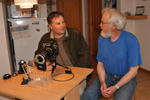 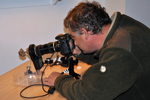 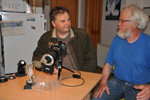 |
||||||||||||||||
The famous biologist Jørgen Lissner visited Faroe Islands again in July 2012. He collected spiders to his incredible website with photos and descriptions about spiders from the Faroe Islands, Greenland, the Azores and Europe. |
||||||||||||||||
Visit Jørgen Lissner's incredible website with Faroese spiders |
||||||||||||||||
| Feather-legged Lace Weaver Uloborus plumipes | ||||||||||||||||
| Found in Tórshavn 28.02.2022 | ||||||||||||||||
| Feather-legged Lace Weaver Uloborus plumipes | ||||||||||||||||
On October 3, 2021, Niels Leivsson í Búð found this beautiful Uloborus spider on a Phalaenopsis orchid in Hvannasund. |
||||||||||||||||
Feather-legged Lace Weaver Uloborus plumipes |
||||||||||||||||
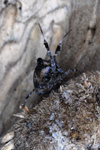 |
||||||||||||||||
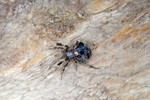 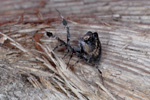 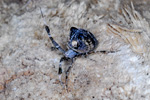 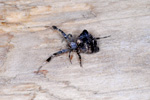 |
||||||||||||||||
This imported female was found in Tórshavn 05th March 2012. This is the fifth discovery for Faroe Islands. |
||||||||||||||||
European garden spider Araneus diadematus (Clerck, 1757). |
||||||||||||||||
| This cross spider Araneus diadematus was found outside on a house in the center of Tórshavn 31.10.2017. | ||||||||||||||||
| __________________________________________________________ | ||||||||||||||||
On 15th of August 2017 Jóanes Olsen found this beautiful female Cross spider Araneus diadematusoutside on a house in Óðinshædd in Tórshavn. The species has only been found a few times earlier, and always indoors. This is the first time, thas this species has been found "in the nature" in the Faroe Islands. |
||||||||||||||||
| __________________________________________________________ | ||||||||||||||||
Pauli Hansen caught these 2 female Cross spiders Araneus diadematus in Tórshavn 24. October 2011. Both have a rather atypical pattern on the back. |
||||||||||||||||
| __________________________________________________________ | ||||||||||||||||
| Tórshavn 02.06.2020 | ||||||||||||||||
02.06.2020 Mourits Mohr Joensen saw hundreds of young spiders on a car that had arrived to the Faroe Islands 10 days earlier. It turned out to be European garden spider Araneus diadematus (Clerck, 1757). Araneus diadematus is very rare in the Faroe Islands and has only been found indoors, with an exception at Óðinshædd in Tórshavn in 2017. The Araneus diadematus lays 300-800 eggs, and it will be interesting to see, if some of these on the car will show up in Faroese nature later on. |
||||||||||||||||
Tarantula |
||||||||||||||||
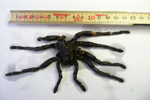 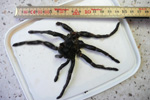 |
||||||||||||||||
On 29. March 2011 Poul Eyðun Joensen found the remains of this Tarantula in a parking space in Fuglefjørður. The spider measures app. 16 cm. between the legs. Karl Hansen notified me about "this catch", which must be the biggest spider ever found outdoor in the Faroe Islands. |
||||||||||||||||
But how did this Tarantula end up in Fuglafjørður? Could it have been imported with goods or is it somebody's pet, that have escaped from captivity? Please contact me in case you have some information. |
||||||||||||||||
Update 07.04.2011: The mystery is solved! |
||||||||||||||||
The Tarantula was a 3 year old Chorco golden Knee female, recently held as a pet by Petur Hansen in Norðagøta. When the spider died, he gave it to a friend, who later throwed it away in Fuglafjørður. |
||||||||||||||||
| Nuctenea umbratica | ||||||||||||||||
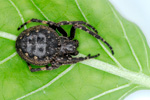 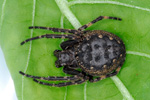 |
||||||||||||||||
Kári Petersen, Sandur, caught this big Nuctenea umbratica female near Skopun. Nuctenea umbratica is found 5 times in the Faroe Islands, but this is the first time, it is found in Sandoy. The site, where it was found, could very well be it's breeding place, but we have no proves yet. |
||||||||||||||||
| 02.08.2018 Óli Lindenskov caught this female Nuctenea umbratica in Hoyvík. This is the 6 registration of this spider in Faroe Islands. The body measures 8-10 mm. We still don't know, if it breeds in the Faroe Islands. | ||||||||||||||||
| Araneus quadratus | ||||||||||||||||
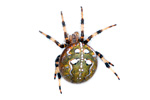 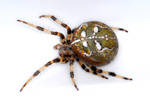 |
||||||||||||||||
Dánial Jespersen found this Araneus quadratus (Clerck, 1757) in Tórshavn 07.10.2010. This spider is only found some few times indoors in the Faroe Islands. |
||||||||||||||||
| Enoplognatha ovata | ||||||||||||||||
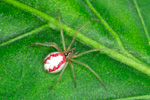 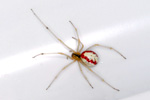 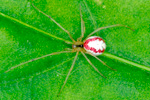 |
||||||||||||||||
This Enoplognatha ovata was on a plant, that Jacoba T. Winther got 01. September 2010. Far to many insects are imported to the Faroe Islands this way. |
||||||||||||||||
| Steatoda bipunctata | ||||||||||||||||
Steatoda bipunctata is an introduced spider, only found in Suðuroy, Streymoy, Nólsoy and Eysturoy. It is found in high number in some large buildings, but it is not considered as common in the Faroes. Hans Eli Sivertsen caught this male 19.11.2009 and Jørgen Lissner determined the species. |
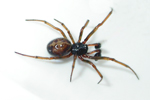 |
|||||||||||||||
| Nuctenea umbratica | ||||||||||||||||
Edith Petersen found this beautiful Nuctenea umbratica spider in Tórshavn 10.08.2009. This is the 4'th observation of this spider in Faroe Islands. |
 |
|||||||||||||||
Jumping Spider Salticidae |
||||||||||||||||
  |
||||||||||||||||
Jógvan Niclasen caught this impressive Jumping spider in a grocery store in Tórshavn 16. September 2008. It is a young female Philaeus chrysops (det. Rudolf Macek, Czech Republic). |
||||||||||||||||
Most likely the spider is a South-european species, hereby registered for the first time in the Faroe Islands. |
||||||||||||||||
| Alopecosa pulverulenta | ||||||||||||||||
24.05.2008 Jóannes Joensen, Klaksvík, made, what I call "a real coup", when he found this rare spider in Kalsoy. Alopecosa pulverulenta has been found 3 times earlier in the Faroes - in Vágoy and Svínoy; but this is the first catch in Kalsoy. All of the 4 spiders found in the Faroes until now have been females. |
 |
|||||||||||||||
Family: Lycosidae (Wolf Spiders). |
||||||||||||||||
| This family is represented in Europe with 260 species in 23 genera. | ||||||||||||||||
| Amaurobius fenestralis | ||||||||||||||||
Male - even though this spider is new for Faroe Islands, it seems to be quite common, especially in Sørvágur and Tórshavn. |
 |
|||||||||||||||
| Metellina merianae | ||||||||||||||||
Very common in Faroe Islands |
||||||||||||||||
Ground Crab Spider Xysticus cristatus |
||||||||||||||||
Peter Meedom found the crab spider Xysticus cristatus in the right corner in Vatnsoyrar, Vágar 23.07.07. Xysticus cristatus is the only species of the crab spider family, ever found in the Faroes. Known from Fugloy, Svínoy, Viðoy, Borðoy, Kunoy, Eysturoy, Nólsoy, Streymoy, Vágar, Koltur, Sandoy, and Suðuroy. |
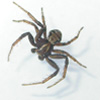 |
|||||||||||||||
| Photo: Hans Eli Sivertsen | ||||||||||||||||
| Alexander B. Jacobsen caught this Xysticus cristatus on Nolsoy 22. January 2015. It has been preserved as proof of the species' occurrence on Nólsoy. | ||||||||||||||||
| Dennis A. Rasmussen caught this Xysticus cristatus male spider 07.06.2021 in Kollafjørður. | ||||||||||||||||
The Pholcus phalangioides spider is spreading all over Faroe Islands |
||||||||||||||||
| A Pholcus phalangioides spider carrying the eggs in the mouth | ||||||||||||||||
| Read the article |
||||||||||||||||
|
||||||||||||||||




